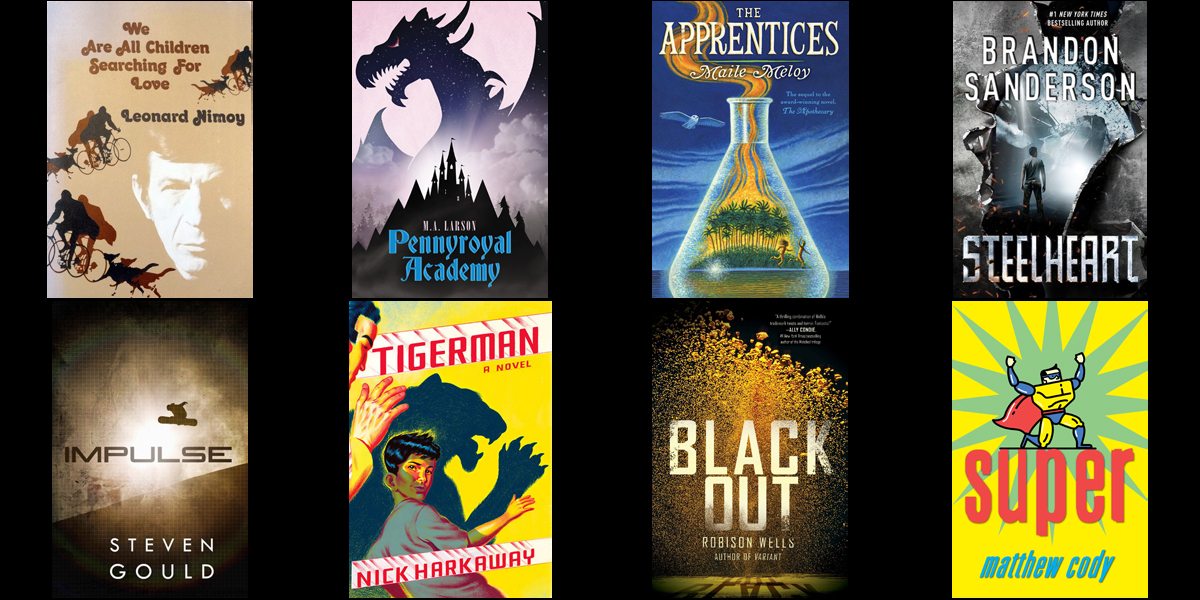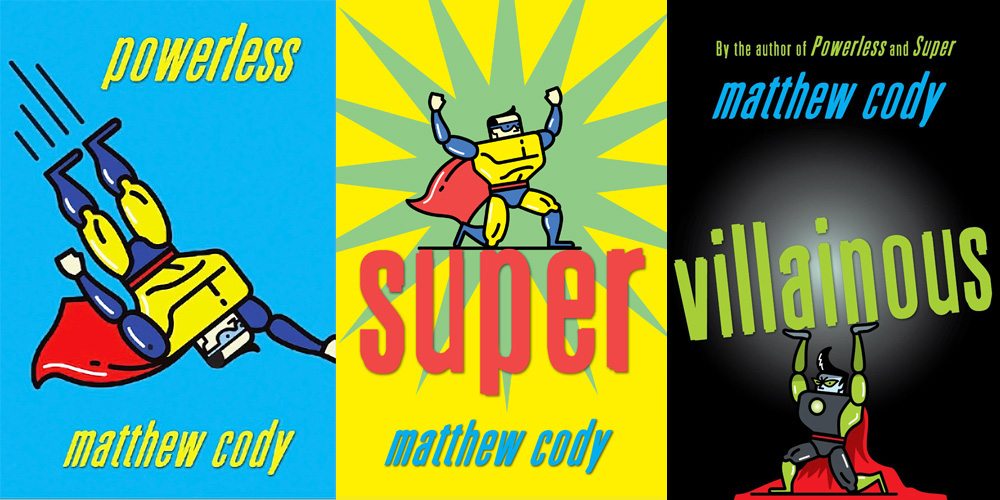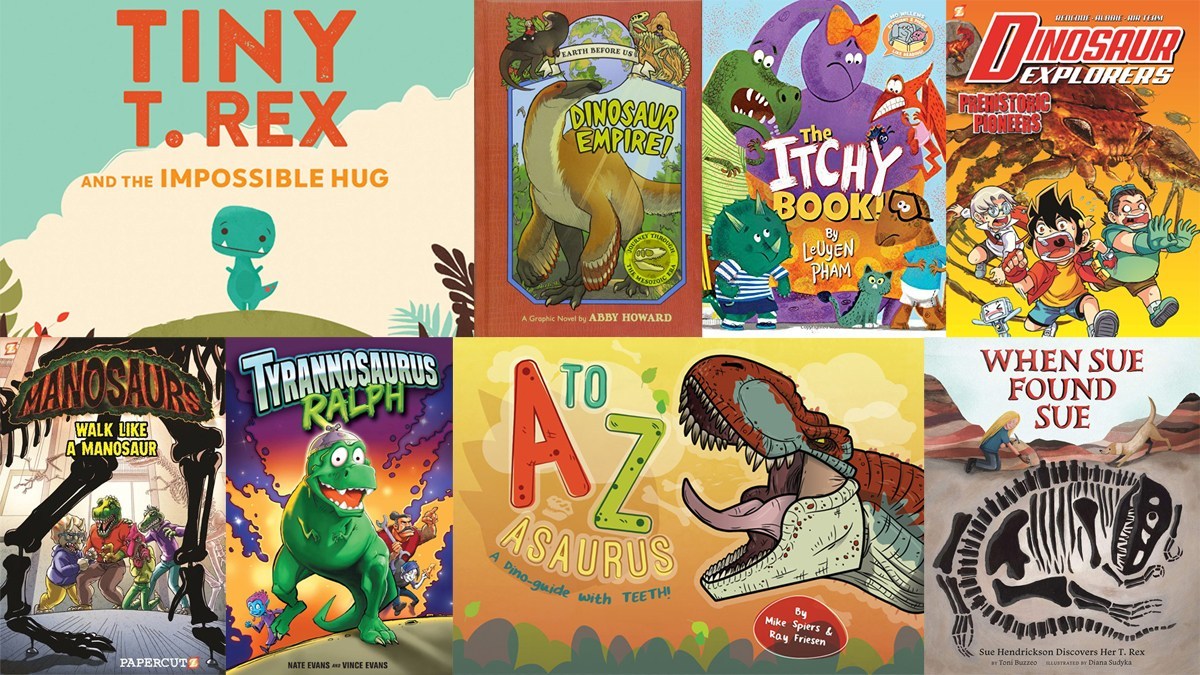My reading pace was a little slower this week, and, since a couple of the books I finished aren’t actually available yet, I’ll take this opportunity to catch up a little on a few books from my backlog–this week, how about superpowers?
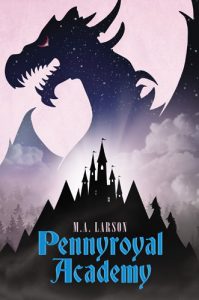 First, though, I did finish reading Pennyroyal Academy by M. A. Larson to my daughters. I mentioned this one in a previous column–it’s a fantasy book for kids, with princesses, knights, dragons, and witches. However, it’s really recasting the role of a princess from being royalty (and getting rescued by knights) to being a specific sort of warrior: one who fights witches.
First, though, I did finish reading Pennyroyal Academy by M. A. Larson to my daughters. I mentioned this one in a previous column–it’s a fantasy book for kids, with princesses, knights, dragons, and witches. However, it’s really recasting the role of a princess from being royalty (and getting rescued by knights) to being a specific sort of warrior: one who fights witches.
In this world, witches aren’t just women with magical skills–they’re almost another species entirely, something more akin to Harry Potter’s Dementors or the ghastly Nazgûl from Lord of the Rings. They feed on fear and despair, and only princesses hold the keys to defeating them: courage, compassion, kindness, and discipline. In this world, these virtues are magical: compassion creates a literal shield against the witch’s dark curses. Courage generates a powerful blast of magical light.
I know, sounds a bit like “friendship is magic,” right? It’s no coincidence. Larson is also a writer for My Little Pony: Friendship Is Magic, and Pennyroyal Academy is certainly about the power of teamwork and friendship, though it is a bit darker in places and the witches can be downright creepy. It also talks about the beginnings of romance (something my daughters ewwwed and ughed about), royalty (the academy allowed commoners to attend, training the lowborn to be princesses), gender (one of the “princesses” is a boy named Basil whose mother always wanted a daughter instead), and fate (there’s a lot of talk of destiny). I think that last bit bothered me the most: the idea that a character is destined to be a hero seems to contradict the idea that anyone could become a hero, the way that some of the commoners in the story actually have more kindness and compassion than the royalty.
Still, I have to admit that I did enjoy reading it to my kids–the writing is pretty good for the most part and the characters are a lot of fun. I like twists on classic fairy tales, and there are references and allusions to traditional princess stories throughout the book.
 I listed Tigerman by Nick Harkaway as my favorite adult fiction book of 2014 but I never really gave it a proper review. First off, if you’re not familiar with Harkaway, you really should check out his first two books, The Gone-Away World (review here) and Angelmaker (my review). His books straddle the (admittedly fuzzy) boundaries between literary fiction and genre fiction–they’re not exactly sci-fi or fantasy, but they do have fantastical elements in them.
I listed Tigerman by Nick Harkaway as my favorite adult fiction book of 2014 but I never really gave it a proper review. First off, if you’re not familiar with Harkaway, you really should check out his first two books, The Gone-Away World (review here) and Angelmaker (my review). His books straddle the (admittedly fuzzy) boundaries between literary fiction and genre fiction–they’re not exactly sci-fi or fantasy, but they do have fantastical elements in them.
In Tigerman, we are introduced to the small island of Mancreu, a former British colony whose expiration date is fast approaching. The island belches clouds of toxic waste with bizarre effects (there’s that fantastical element I was talking about), and so the international community has decided to nuke it from orbit, so to speak. In the meantime, the island has become the location for any nation that needs a place for its extralegal activities. This is one of the things that Harkaway seems to do really well: sussing out realistic real-world implications of a bizarre, imaginary premise.
On this island, nearly-retired Sergeant Lester Ferris has an important job: do nothing. He’s seen enough combat and so now he (like everyone else on Mancreu) pretends not to see the Fleet, all those ships parked out there in the bay that, legally, don’t really exist. Then Lester befriends a boy, one who has been educated by comic books and the Internet, and it awakens in him a desire to be a protector, a champion, a father.
The supernatural (or extra-natural) in Tigerman doesn’t extend to Lester, really. He doesn’t gain a bunch of superpowers through exposure to this toxic gas. He’s more of a Batman figure, though without the mansion and the tragic backstory and the high-tech gadgets. Maybe he’s more like MacGyver, actually. What makes him compelling is the way he comes to grips with what’s going on at the island, and the way he starts to take things into his own hands. I can’t say much more without giving away too much, but if you’re looking for a great story, check this one out.
And now for some books that have been lingering on my “to be reviewed” shelf for way too long. My problem is that I can read while doing other things–while eating, cooking, sitting out at the park with my kids–but I can only write up my reviews here at my desk. (I’ve never liked laptops, so I have a desktop computer only.) The books I’ve read accumulate and pile up, and the next thing I know, it’s been a couple years and, oh, did I never review that one after all? So here are a few from the wayback burner.
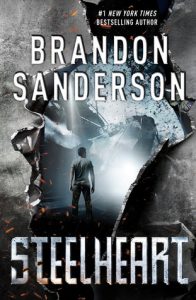 Steelheart by Brandon Sanderson is about people with superpowers. But it’s not a superhero book. Why? Because, in this world, the Calamity gave extraordinary powers to many people (now known as Epics), and they all turned out evil. It’s not clear whether only villains gained powers, or whether there’s something in the powers that turns them to evil, but there are no superheroes, only supervillains.
Steelheart by Brandon Sanderson is about people with superpowers. But it’s not a superhero book. Why? Because, in this world, the Calamity gave extraordinary powers to many people (now known as Epics), and they all turned out evil. It’s not clear whether only villains gained powers, or whether there’s something in the powers that turns them to evil, but there are no superheroes, only supervillains.
Steelheart is one such villain who is pretty much invincible. He rules what was once Chicago, and the normal people live in fear. But there is a resistance (of course). The Reckoners live in the shadows, investigating Epics, finding their weaknesses, and assassinating them. David, whose father was killed by Steelheart, wants to join the Reckoners, and he has a secret: he has seen Steelheart bleed.
The premise fascinated me, and part of Sanderson’s inspiration came from an incident when he got cut off in traffic. He said that if he’d had superpowers, he certainly would have taken out that other driver–and this led him to wonder why we think people who suddenly gain superpowers would use them for good. What if they didn’t?
The story itself is, as you would expect, pretty fast-paced with lots of tense moments. David thinks fast on his feet, but he is also incredibly lucky a lot of the time. It’s a wonder he doesn’t get killed several times throughout the book. There’s also a fun mix of superpowers and high-tech gadgetry in the book, too. It’s been a while since I read it, but it’s a nice addition (and contrast) to my collection of superhero fiction. The second book in the series, Firefight, just came out in January, but I haven’t read that one yet.
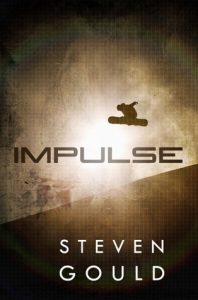 And speaking of superpowers, here’s another book that’s overdue for a review: Impulse by Steven Gould. It’s the third book in the Jumper series, though I haven’t read the first two. Normally when I receive a copy of a book in a series that I haven’t read, it goes straight into the “don’t want” pile, but for some reason this one caught my attention. I’ll admit: before I read this one, the only thing I knew about Jumper was the 2008 movie about some kid who could teleport and the people (including Samuel L. Jackson) who were trying to catch them. I’d seen the trailer and thought it looked a bit over-the-top, and never saw the movie. I didn’t know it was based on a book–one that I probably would have enjoyed when it came out (when I was in high school).
And speaking of superpowers, here’s another book that’s overdue for a review: Impulse by Steven Gould. It’s the third book in the Jumper series, though I haven’t read the first two. Normally when I receive a copy of a book in a series that I haven’t read, it goes straight into the “don’t want” pile, but for some reason this one caught my attention. I’ll admit: before I read this one, the only thing I knew about Jumper was the 2008 movie about some kid who could teleport and the people (including Samuel L. Jackson) who were trying to catch them. I’d seen the trailer and thought it looked a bit over-the-top, and never saw the movie. I didn’t know it was based on a book–one that I probably would have enjoyed when it came out (when I was in high school).
Impulse, published in 2013, is about Cent, the teenage daughter of Davy and Millie. Without having read the previous books, I didn’t know much about Davy and Millie, except that they live off-the-grid and they both have the ability to teleport–and now Cent does, too. Davy and Millie use their teleporting abilities to do humanitarian work, teleporting supplies past checkpoints, but they keep Cent sheltered away in their house in the Canadian Rockies, completely separate from all other people. As you can imagine, this isn’t a great life for a teenager.
They finally consent to letting Cent attend public school. They relocate to a small town (most of their stuff is still in Canada, but they can go back there whenever they want) and Cent starts to navigate the terrible world of high school relationships. She starts using her powers to get back at the queen bee mean girl, but then finds herself caught up in something much larger.
There were two things that I really liked about Impulse. The first was the way Cent experimented with the idea of teleporting, messing with momentum and working out the implications of being able to teleport to different locations on the Earth, which is in reality hurtling through space at incredible speeds. I get the sense that Gould himself made some realizations, and was able to really play with the concept. It was fun (and, as a parent, just a little scary) to think about Cent pushing the boundaries beyond what her parents could do. I also liked that the book, despite the fantastical premise, dealt with a lot of real-world issues in a serious way. I wasn’t expecting that at all (particularly based on the movie trailer). Just in this book Gould handles the topic of warfare, bullying, and drugs. Oh, and also helicopter parenting vs. free-range kids–something that takes on new meanings when you’re hiding from authorities.
All in all, it was a great read, and I’m curious to go back and read the first two, plus there’s now a fourth book in the series, Exo, published in September.
 I’ve read a few series that put powers in the hands of teenagers, like the Super Human series by Michael Carroll, which I reviewed a few years ago. Giving powers exclusively to teenagers and kids is probably a popular idea because in many cases these are kids still working out their identities–what sort of people are they and who do they want to become? Gaining powers is often a metaphor for adolescence: your body changes and it feels like you don’t have control over yourself. You do and say stupid things that you might regret, and then have to work out the consequences.
I’ve read a few series that put powers in the hands of teenagers, like the Super Human series by Michael Carroll, which I reviewed a few years ago. Giving powers exclusively to teenagers and kids is probably a popular idea because in many cases these are kids still working out their identities–what sort of people are they and who do they want to become? Gaining powers is often a metaphor for adolescence: your body changes and it feels like you don’t have control over yourself. You do and say stupid things that you might regret, and then have to work out the consequences.
Blackout by Robison Wells is another situation where teenagers have the power–this time because of a virus. Some of the kids were infected intentionally, as sleeper agents, and now the time has come to carry out a strike on the United States, starting with the power grid. Laura, Alec, and Dan are three such teenagers, using their abilities to devastating results. But other kids are starting to exhibit abilities, too, though not always really powerful. Aubrey is able to vanish, and has always felt like a freak for it. Another friend was able to turn into a monster of some sort. Now the military is rounding up teenagers, testing them for the virus, and trying to use them as weapons against the terrorists… but there are some terrorists in their midst.
The book jumps around a lot, between some of the terrorist kids and the other teens who are swept up into the war. This being a young adult dystopian novel, of course there’s also a bit of romance. I found the government’s response to the terror attacks realistically disappointing and reactionary, though the teenage terrorists’ motivations weren’t always quite as convincing. What would motivate all of these teenagers to turn against the home where they grew up for a country they’ve only known secondhand? Still, if you can suspend your disbelief about that, there’s a good story to be had.
While we’re on the topic of kids with powers, here’s another series: I’ve read the first two books of the series and enjoyed them, but haven’t gotten to the third yet. Matthew Cody’s Super trilogy is set in the small town of Noble’s Green, where all the kids have superpowers. But when they turn thirteen, they lose their powers and even their memories of them. Daniel is new to town–he doesn’t have any powers, but he does have a suspicion that there’s something behind the vanishing powers and abilities. In the second book, Daniel somehow gains powers even while his friends are losing theirs, and they start to wonder if he’s working against them.
This trilogy is better-suited to the middle-grade crowd than the ones above, which are better for teens, and is a fun mash-up of superpowers and detective work. The main thing you’ll have to suspend disbelief for in this series (aside from the powers themselves, of course) is that all the preteens in a town would voluntarily agree to keep their powers hidden from adults and older kids. Yeah, sure.
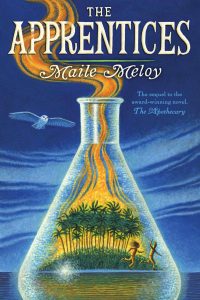 Several years ago I read The Apothecary by Maile Meloy, a wonderful book set in post-war London involving spies and magical alchemy. The sequel, The Apprentices, was published a couple years ago and I really should have written it up sooner. Since it’s hard to talk about the second book without giving some spoilers from the first, if you want to avoid spoilers, just skip down to the next book below.
Several years ago I read The Apothecary by Maile Meloy, a wonderful book set in post-war London involving spies and magical alchemy. The sequel, The Apprentices, was published a couple years ago and I really should have written it up sooner. Since it’s hard to talk about the second book without giving some spoilers from the first, if you want to avoid spoilers, just skip down to the next book below.
Spoiler alert: So at the end of the first book, Janie Scott has her memory wiped. She doesn’t remember anything at all of her adventures in alchemy, nor Benjamin Burrows, the apothecary’s son who became a huge part of her life for a brief while. Then she receives a package from him, including a diary in her own handwriting, and things start falling into place.
Benjamin has figured out a way for them to communicate remotely using a powder that lets them temporarily inhabit the other person’s mind–a la Being John Malkovich. Janie has been kicked out of her school unjustly and is working to prove her innocence. Benjamin, meanwhile, has been in war-torn Vietnam, trying to help the wounded and sick with magical (and non-magical) remedies. Their two lives intersect again as deeper plots are uncovered.
The alchemy in the book is very akin to magic, but the pseudo-scientific explanations are a fun alternative to more traditional wands-and-incantations magic. It is also fun to be transported to a different time and place than I’ve usually seen in teen fiction. It’s not so ancient as to be unrecognizable, but predates most of the technology that today’s teens take for granted. And, once again, the interior illustrations by Ian Schoenherr are wonderful and help set the tone of the book.
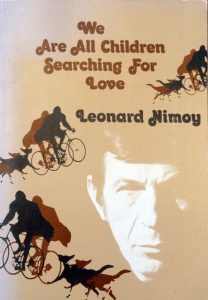 I’ll end with this–a different sort of powerful. With the passing of Leonard Nimoy last week, I was reminded of some of my experiences of him in college, like listening to a WAV file of “Highly Illogical” (back when my roommates and I were just discovering the idea of searching for things on the internet). About nine years ago, one of my roommates sent me a copy of We Are All Children Searching For Love, a collection of poems and photography by Nimoy, published in 1977.
I’ll end with this–a different sort of powerful. With the passing of Leonard Nimoy last week, I was reminded of some of my experiences of him in college, like listening to a WAV file of “Highly Illogical” (back when my roommates and I were just discovering the idea of searching for things on the internet). About nine years ago, one of my roommates sent me a copy of We Are All Children Searching For Love, a collection of poems and photography by Nimoy, published in 1977.
At the time, it was more of a gag gift–the book is pretty dated, and the photographs are all presented in a sepia-toned, highly-polarized form, like photocopies of photocopies. Many of the poems have a straightforward ABCB rhyme scheme and some are free verse, and they’re all quite sentimental. At the time, we mostly just found humor in the idea that the man who played Spock wrote sappy love poems. But reading through the book of poems this weekend shed some new light on him, and although I can’t say I still didn’t find some of the poetry too simple and saccharine for my tastes, I think they do provide some insight into the man behind that public face. Here’s one poem in particular that stood out to me:
There is in me
A being little known
To others
A person,
man or boy
Locked away
I believe
That he is me
More me
Than the one
Anyone knows
And that he
Deserves at least
A trial
Before being sealed away
Forever
Locked inside
The public face.
I like to think that between the time this poem was written and now, that Nimoy was able to let this “little known” version of himself out, that he wasn’t trapped behind the Spock persona.
Disclosure: I received review copies or advance proofs of the books mentioned in this review unless otherwise noted.
